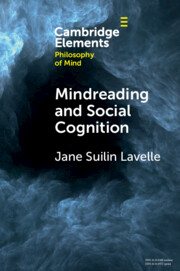Mindreading and Social Cognition
£17.00
Part of Elements in Philosophy of Mind
- Author: Jane Suilin Lavelle, University of Edinburgh
- Date Published: February 2022
- availability: Available
- format: Paperback
- isbn: 9781108925051
£
17.00
Paperback
Other available formats:
eBook
Looking for an inspection copy?
This title is not currently available on inspection
-
The cognitive ability to think about other people's psychological states is known as `mindreading'. This Element critiques assumptions that have been formative in shaping philosophical theories of mindreading: that mindreading is ubiquitous, underpinning the vast majority of our social interactions; and that its primary goal is to provide predictions and explanations of other people's behaviour. It begins with an overview of key positions and empirical literature in the debate. It then introduces and motivates the pluralist turn in this literature, which challenges the core assumptions of the traditional views. The second part of the Element uses case studies to further motivate the pluralist framework, and to advocate the pluralist approach as the best way to progress our understanding of social cognitive phenomena.
Customer reviews
Not yet reviewed
Be the first to review
Review was not posted due to profanity
×Product details
- Date Published: February 2022
- format: Paperback
- isbn: 9781108925051
- length: 75 pages
- dimensions: 228 x 152 x 5 mm
- weight: 0.144kg
- availability: Available
Table of Contents
1. Introduction
2. A brief history of mindreading
3. The new pluralism
4. Mindreading in infancy
5. Mindreading across cultures
6. Power differentials and mindreading
7. Conclusions.
Sorry, this resource is locked
Please register or sign in to request access. If you are having problems accessing these resources please email [email protected]
Register Sign in» Proceed
You are now leaving the Cambridge University Press website. Your eBook purchase and download will be completed by our partner www.ebooks.com. Please see the permission section of the www.ebooks.com catalogue page for details of the print & copy limits on our eBooks.
Continue ×Are you sure you want to delete your account?
This cannot be undone.
Thank you for your feedback which will help us improve our service.
If you requested a response, we will make sure to get back to you shortly.
×

